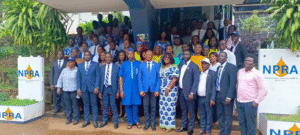World Bank Applauds Sierra Leone’s Fuel Price Reforms, Urges Broader Economic Overhaul
By kadiatu sankoh
The Sierra Leone World Bank Economic Update has commended the National Petroleum Regulatory Authority (NPRA) for its successful reform initiatives, noting that fuel prices have dropped by more than 25% since the review of the country’s fuel pricing formula.
According to the report, the new pricing model has significantly enhanced fiscal capacity, enabling the government to tap into additional revenue streams from the petroleum sector—critical for financing essential services and development programs nationwide. The President emphasized that this improved system has strengthened the country’s economic planning capabilities.

Titled “Enabling the Private Sector for Growth and Job Creation,” the report highlights how the full-pass-through pricing model allows changes in international oil prices to be directly reflected in local pump prices. This transparency not only stabilizes government revenue collection amid global market fluctuations but also ensures more effective resource allocation. The Minister of Finance described the NPRA’s pricing system as pivotal in steering Sierra Leone’s economy toward greater sustainability and resilience.

Established under the National Petroleum Regulatory Authority Act of 2025, the NPRA regulates and licenses the downstream petroleum sector, ensuring affordability and consistent supply. The report praises the full-pass-through system as a vital tool for aligning domestic fuel prices with global trends.
Despite these achievements, the report cautions that Sierra Leone continues to grapple with high inflation, external shocks, and other macroeconomic pressures. To overcome these challenges, the Sierra Leone Economic Update (SLEU) calls for comprehensive structural reforms aimed at boosting private sector competitiveness and attracting investment.

Improving the business environment must be a priority, the report stresses. Regulatory bottlenecks and poor infrastructure remain major obstacles to growth. Removing these barriers is essential for stimulating economic activity and generating employment opportunities.
The report further emphasizes the importance of collaboration between the government and private sector. Engaging business stakeholders will help identify investment challenges and tailor reforms to create a more dynamic economic ecosystem. Effective feedback mechanisms can empower businesses to express concerns, fostering an adaptive regulatory framework.
Additionally, the SLEU calls for enhanced transparency and accountability within the NPRA and the wider petroleum sector. Strengthening governance will build public trust, boost investor confidence, and reinforce the government’s commitment to responsible resource management.
As Sierra Leone charts its path forward, the World Bank report offers a valuable roadmap for recovery and growth. The success of the full-pass-through pricing reform demonstrates what effective policymaking can achieve. However, addressing the nation’s deeper economic vulnerabilities remains essential.
While the NPRA’s strategy provides a strong foundation for increased revenue, broader reforms are needed to stimulate private sector activity. By cultivating an investment-friendly environment and expanding opportunities for business growth, Sierra Leone can advance toward sustainable economic development that benefits all citizens.